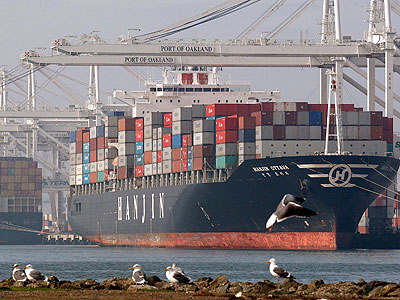
The signing of Phase One of the Trump Administration's trade deal with China on January 15, 2020 as shown here:
…suggests that at least some progress is being made, however, the deal still leaves most of the trade war-related tariffs that have created problems for both manufacturers and consumers. A recent piece in the Global Times, the Communist Party of China's unofficial newspaper, suggests that China is well aware of the deal's shortcomings.
Let's start by looking at the comments made by Donald Trump at the signing ceremony:
"Today, we take a momentous step — one that has never been taken before with China — toward a future of fair and reciprocal trade, as we sign phase one of the historic trade deal between the United States and China. Together, we are righting the wrongs of the past and delivering a future of economic justice and security for American workers, farmers, and families….
So, for decades, American workers, farmers, ranchers, manufacturers, and innovators have been hurt by the unfair trade with China. Forced technology transfer and intellectual property theft have been huge problems. Since China joined the World Trade Organization two decades ago, we have racked up nearly $5 trillion — the Vice Premier, I hope he’s not listening to this — (laughter) — in trade deficits, lost millions and millions of manufacturing jobs, and saw tens of thousands of factories close. And that had to do, also, with Mexico, and, to an extent, Canada.
What they did to this country with trade and trade deals — NAFTA. We had no deal with China. I mean, we had no deal. And it was like just easy pickings.
For years, politicians ran for office, promising action to remedy these practices, only to do nothing but allow them to continue. And it was pillage.
As a candidate for President, I vowed strong action. It’s probably the biggest reason why I ran for President, because I saw it for so many years. And I said, “How come nobody is doing something about it?” In the meantime, immigration, and building our military — also important. But that’s probably the biggest reason.
In June of 2016, in the great state of Pennsylvania, I promised that I would use every lawful presidential power to protect Americans from unfair trade and unfair trade practices. Unlike those who came before me, I kept my promise. They didn’t promise too hard but — (applause) — they didn’t do anything. And I actually think I more than kept my promise.
Now our efforts have yielded a transformative deal that will bring tremendous benefits to both countries. We have a great relationship with China, we have a great relationship with the leadership of China, and China fully understands that there has to be a certain reciprocity. There has to be. It cannot continue like this. It would be dangerous for it to continue like it was.
The agreement we signed today includes groundbreaking provisions in an area of critical importance to the United States: protecting intellectual property. So the deal you’re seeing today is a much bigger deal than — we have it very much guarded…
This is an unbelievable deal for the United States. And, ultimately, it’s a great deal for both countries. And it’s going to also lead to even a more stable peace throughout the world.
And it’s all a very, very beautiful game of chess, or a game of poker, or — I can’t use the word “checkers” because it’s far greater than any checker game that I’ve ever seen. But it’s a very beautiful mosaic.
But China is giving us a lot of help, and we’re giving them a lot of help on things that we help them with. And one of the things that we are also talking about is fentanyl. And President Xi has already instituted very strong penalties and arrested large numbers of people who are sending fentanyl into our country. That never happened before. (Applause.)
So China has made substantial and enforceable commitments regarding the protection of American ideas, trade secrets, patents, and trademarks. This was not, according to most — they didn’t know we covered any of this. We’ve covered a lot of this. It’s phase one. But they’re doing many more things in phase one than anyone thought possible.
China has also pledged firm action to confront pirated and counterfeit goods, which is a big problem for many of the people in the room — the counterfeiting. We’ll make sure that this happens, and we have very, very strong protection.
In addition, the agreement addresses forced technology transfer policies that can require companies to give away their know-how and trade secrets. So now, when Boeing has some work done over in China or wants to sell planes over in China, they don’t have to give up every single thing that they’ve ever — you know, that they’ve worked so hard to — to develop and to come up with. Are you guys hearing that? You don’t have to give up anything anymore. Just be strong. Just be strong. Don’t let it happen. But you don’t have to do that.
It was a terrible — it was a terrible situation going on there. And a lot of it was because our co- — our companies, I have to say this, were very weak. You were very weak. You gave up things that you didn’t have to give up. But now, legally, you don’t have to give them up.
Under this deal, transfers and licensing of technology will be based on market terms that are fully voluntary and reflect mutual agreement.
Phase one will also see China greatly expand imports of the — to the United States. We want to buy a lot of their product inexpensively.
But we have an additional $200 [billion]. They are going to be what — what is, to me, very important. Number one, they’re going to be spending much more than $200 billion over the next two years, including up to $50 billion just on agriculture alone.
And some of the numbers that I wrote down — on manufacturing, they’ll be spending $75 billion. They’ll be putting into our country, okay? They’re going to be putting into our country $75 billion on manufacturing. Fifty billion dollars’ worth of energy. So that’s great for our energy people. We’re the number one in the world now; we weren’t. We’re now the number-one energy group in the world. We’re bigger than Saudi Arabia, and we’re bigger than Russia. We’re bigger than everybody. (Applause.)"
It all sounds great, doesn't it?
Now, let's see what China had to say in response one week after the signing of Phase One. Here is a screen capture of the entire article:
Here are some key excerpts:
"He (Trump) touted that most tariffs on Chinese products would remain during talks for a phase two agreement and again falsely claimed that the US was being paid "billions and billions of dollars a year" because of the tariffs. At the forum, Trump renewed his threat to impose hefty tariffs on European cars if the EU does not agree to a trade agreement in favor of the US. If the US president might seem erratic and just wants to appear tough on the global stage for a partisan audience at home, US Treasury Secretary Steven Mnuchin, who was also in Davos, left no doubt that the US would continue on the same path. Echoing his boss, he threatened tariffs on Italy and the UK if the two US allies went ahead with taxes on US technology companies.
Mnuchin, who plays a major role in the US' trade negotiations with China, added that the US could maintain some tariffs on Chinese products even if the two countries reach a more comprehensive deal, according to the Wall Street Journal.
Needless to say, such comments are not at all helpful coming before Beijing and Washington even start talks on a phase two agreement. Laying out the US' stance ahead of the talks will definitely not bode well with Chinese officials, who have already shown reluctance in rushing into negotiations for a phase two deal." (my bold)
Here is the key:
"The warning lights are already flashing. Trump started the tariff war with China to drive down the US' trade deficit with China, but the tariffs have also contributed to significant declines in bilateral trade. …
Some in Washington might loath the massive trade between China and the US, but that has been a bedrock and stabilizer of China-US relations. What the bilateral relationship will be without it is simply unimaginable."
The Trump Administration seems possessed by the idea of America's trade deficits with any nation. While the trade deficit with China is the largest among all of America's trading partners, it is far from the only nation with a negative merchandise trade balance as shown here:
Another issue with the current deal is China's obligation to increase its purchases of U.S. goods and services to $200 billion above 2017 levels (a 92 percent increase) over the next two years. In order to fulfill this pledge, rather than relying on the open market to determine purchasing decisions, China will have to rely on its state-owned businesses to fulfill the obligation. As well, while the bilateral or two-way trade relationship between China and the United States will be set in stone, there will be a ripple effect throughout the global economy since global trade does not just take place between two nations, it relies on the multilateral relationships between nations as shown on this graphic which shows the nations that China exports products to:
…and this graphic which shows the nations that China imports from:
As you can easily see, any impact that the new, incomplete trade agreement between the United States and China will ripple though the global economy, particularly the nations that export goods to China since China is now obligated to purchase more American goods and services.
Here is a quote regarding the importance of multilateral free trade from the Library of Economics and Liberty:
"The best possible outcome of trade negotiations is a multilateral agreement that includes all major trading countries. Then, free trade is widened to allow many participants to achieve the greatest possible gains from trade. After World War II, the United States helped found the General Agreement on Tariffs and Trade (GATT), which quickly became the world’s most important multilateral trade arrangement.
The major countries of the world set up the GATT in reaction to the waves of protectionism that crippled world trade during—and helped extend—the Great Depression of the 1930s. In successive negotiating “rounds,” the GATT substantially reduced the tariff barriers on manufactured goods in the industrial countries. Since the GATT began in 1947, average tariffs set by industrial countries have fallen from about 40 percent to about 5 percent today. These tariff reductions helped promote the tremendous expansion of world trade after World War II and the concomitant rise in real per capita incomes among developed and developing nations alike. The annual gain from removal of tariff and nontariff barriers to trade as a result of the Uruguay Round Agreement (negotiated under the auspices of the GATT between 1986 and 1993) has been put at about $96 billion, or 0.4 percent of world GDP."
If we think that the United States – China trade war is over simply because Phase One has been signed then I would suggest that we think otherwise. China's leadership, through its media outlet, has made it quite clear that they are prepared for their bilateral trade relationship with the United States to remain on shaky ground, a reality that greatly concerns them.
Click HERE to read more from this author.
You can publish this article on your website as long as you provide a link back to this page.

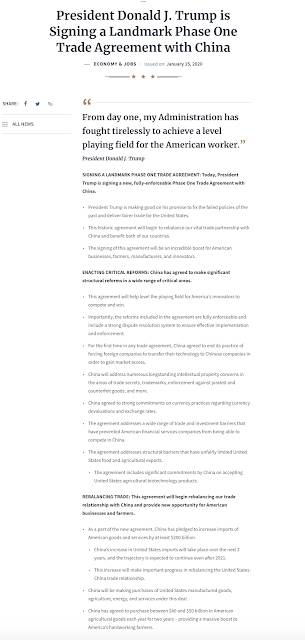
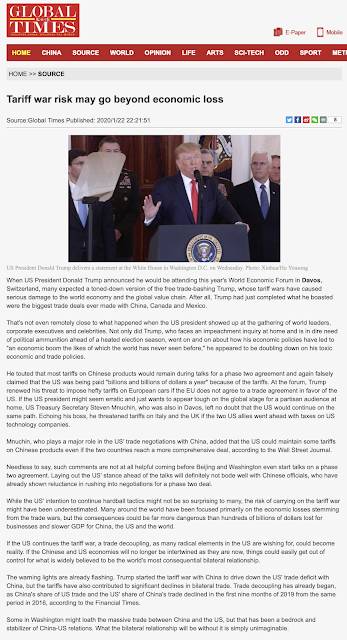
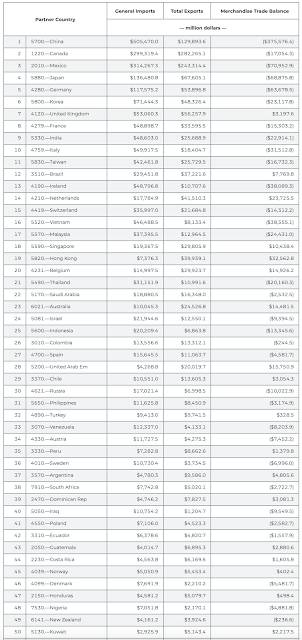
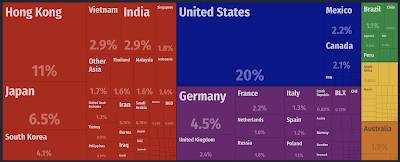
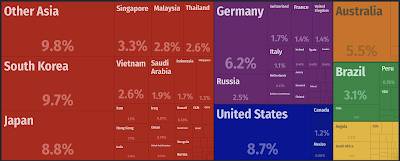
When there are great determination and understanding between two countries of same interest, There will be a great economic success between the two. I think it is about to happen between US and China.